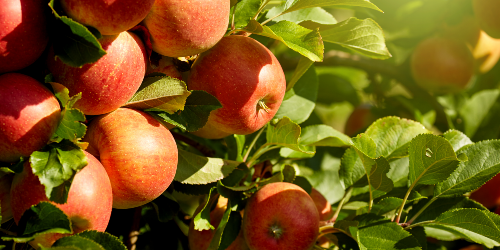The soil for apple orchards should be fertile, rich in nutrients and organic matter. It should provide trees with adequate humidity, be aerated with a slightly acidic pH at 6.2-6.7.
For deeply rooted fruit trees, both the humus level and the properties of the deeper layers, i.e. subsoil, are important. For apple trees, brown, podzolic soils and luvisols made of light clay, clay sand, silt deposits and loess are good. Apple trees are also cultivated on chernozem, loess, dust and light alluvial soils, and in deep rendzinas.
Particular attention should be paid to the groundwater depth. The apple tree is sensitive to high groundwater levels, especially to large fluctuations in its level during the growing season. For apple trees with dwarf rootstocks, the groundwater should be approx. 120 cm deep, and on strong-growing rootstocks - approx. 160 cm.
Well-balanced fertilization of an apple orchard, ensuring high and good-quality yield, should be supported by an earlier chemical analysis of the soil and an analysis of the content of minerals in the leaves. Fertilization is always based on soil fertilization, but in the case of limited uptake or transport of nutrients in the plant, foliar fertilizers that are absorbed quickly come in handy.
Fertilization technologies
Taking into account the different expectations of farmers in terms of crop nutrition, we have prepared for you three complete proposals for foliar fertilization.
The following technologies have been prepared in response to these expectations, in order to optimally nourish the crop and are for reference. If you have any questions regarding the details of the technology and the adjustment of the individual dosage of the indicated products, we invite you to contact our Team.
















